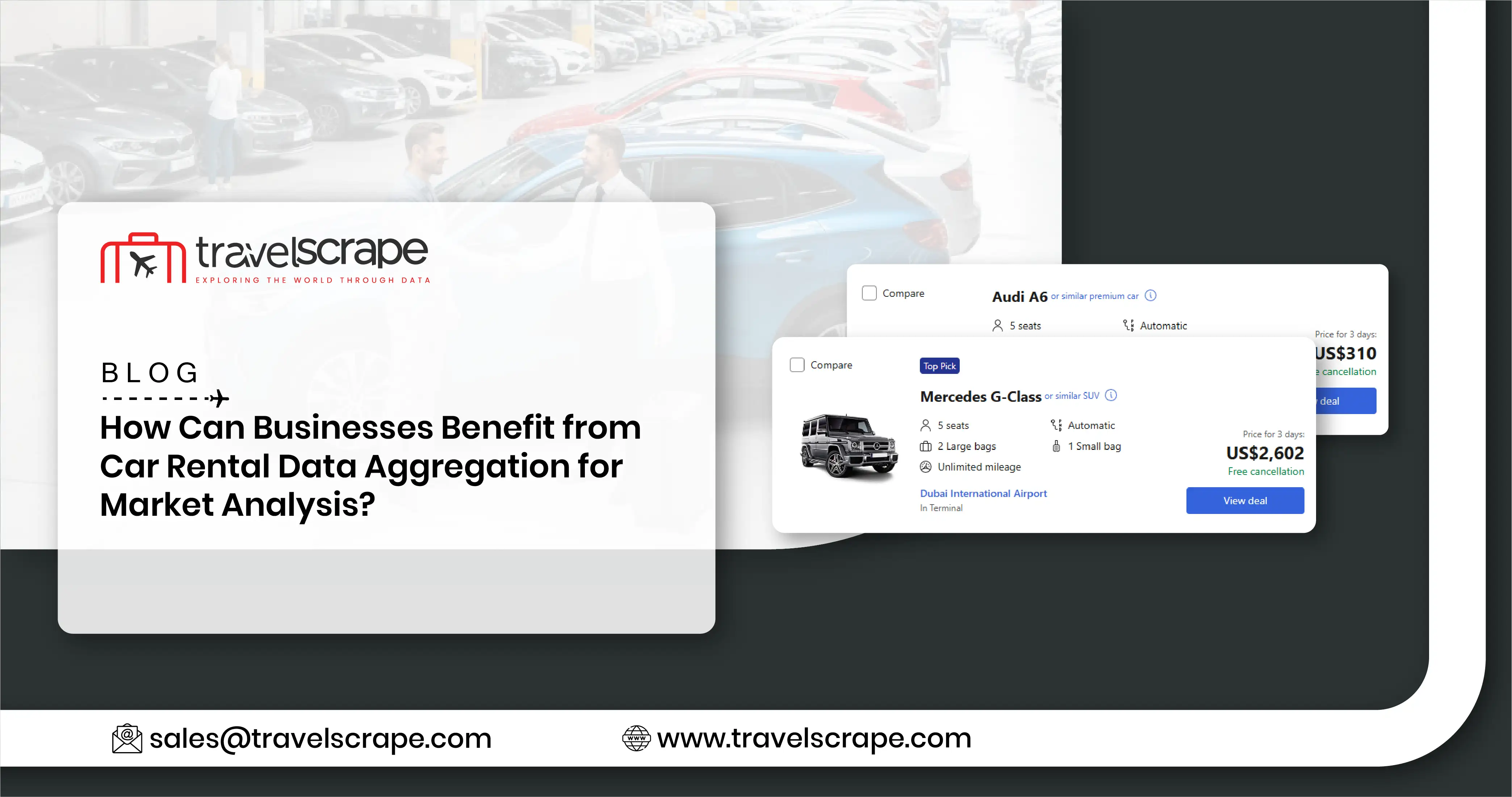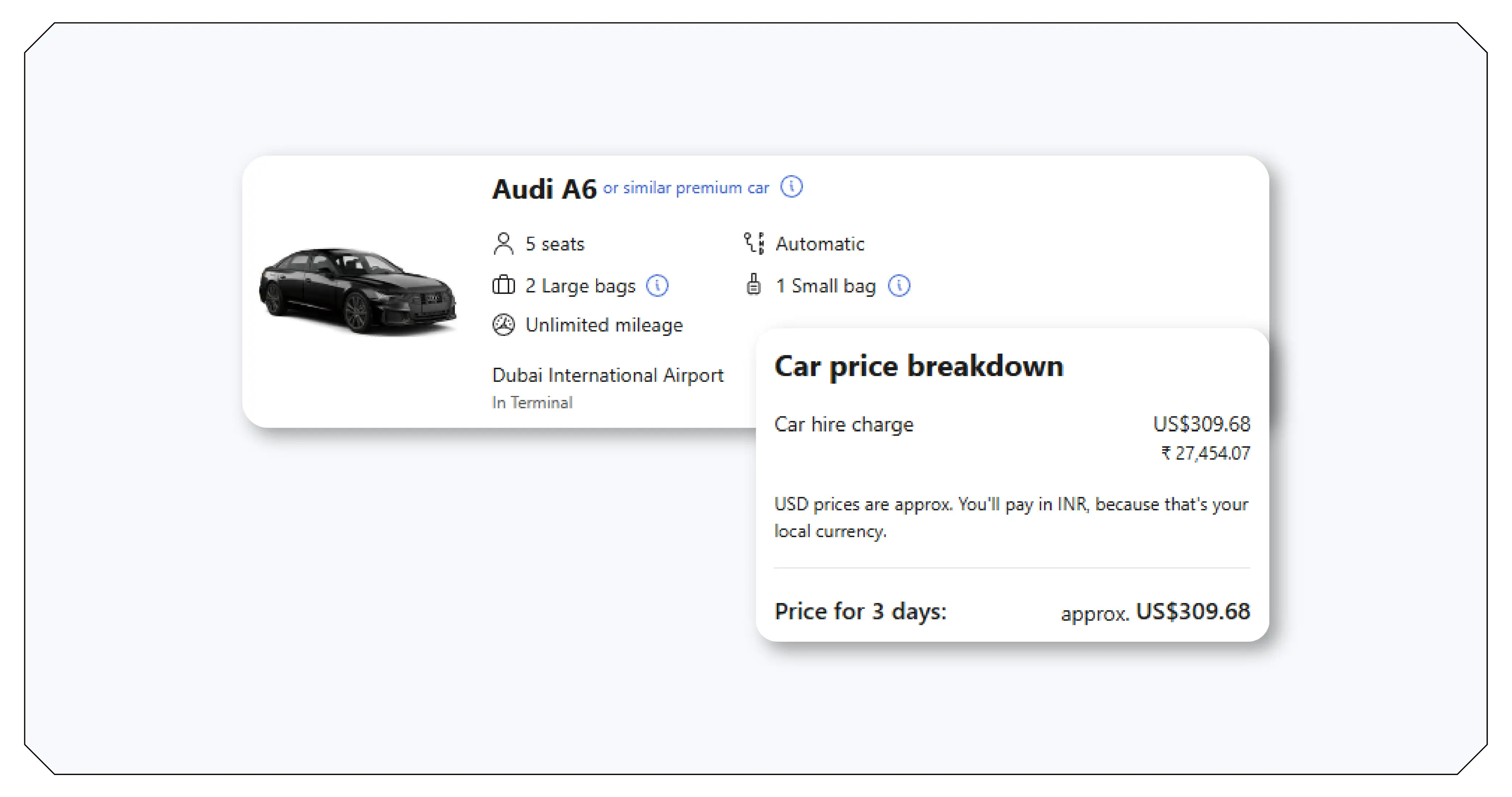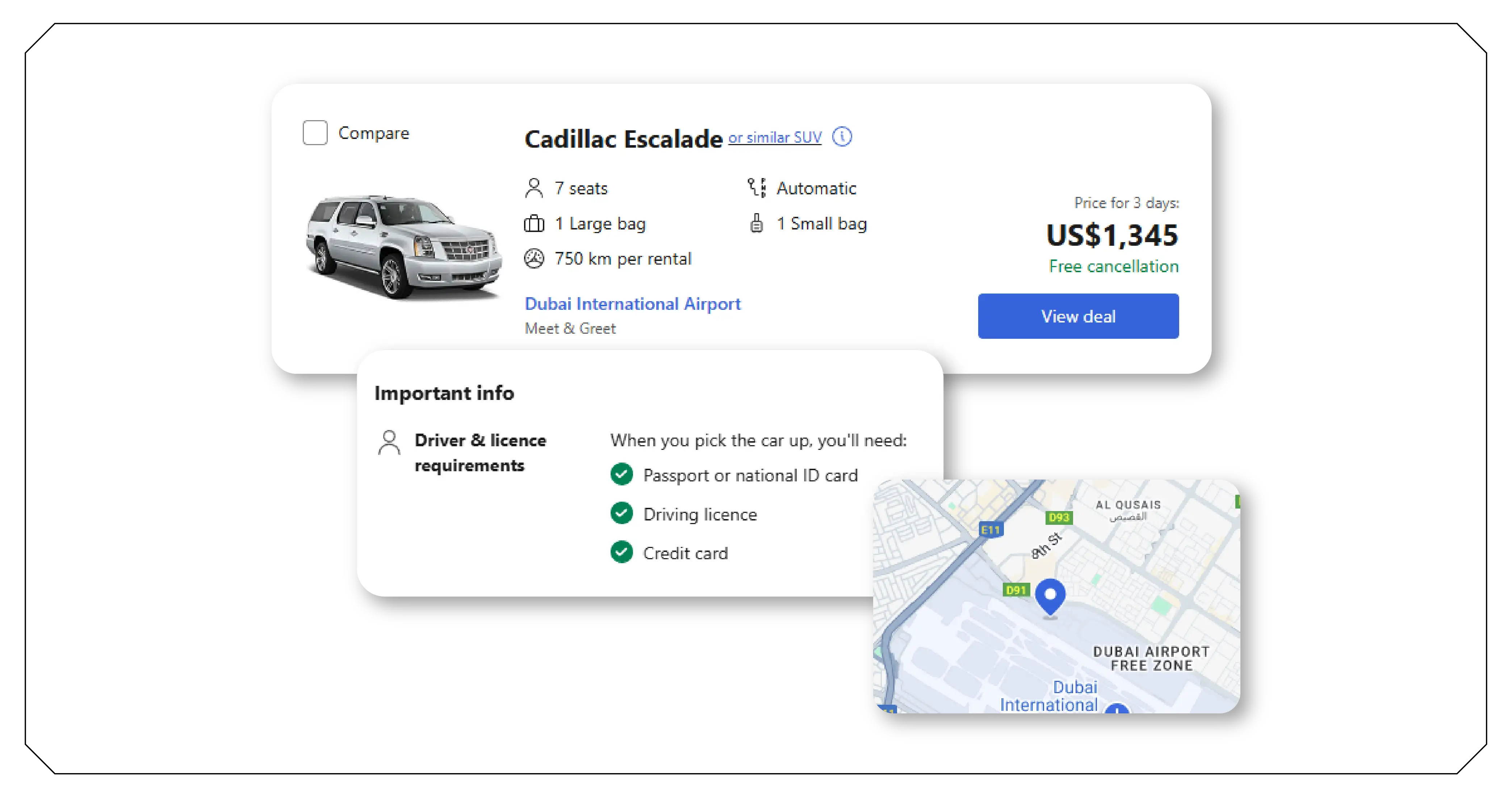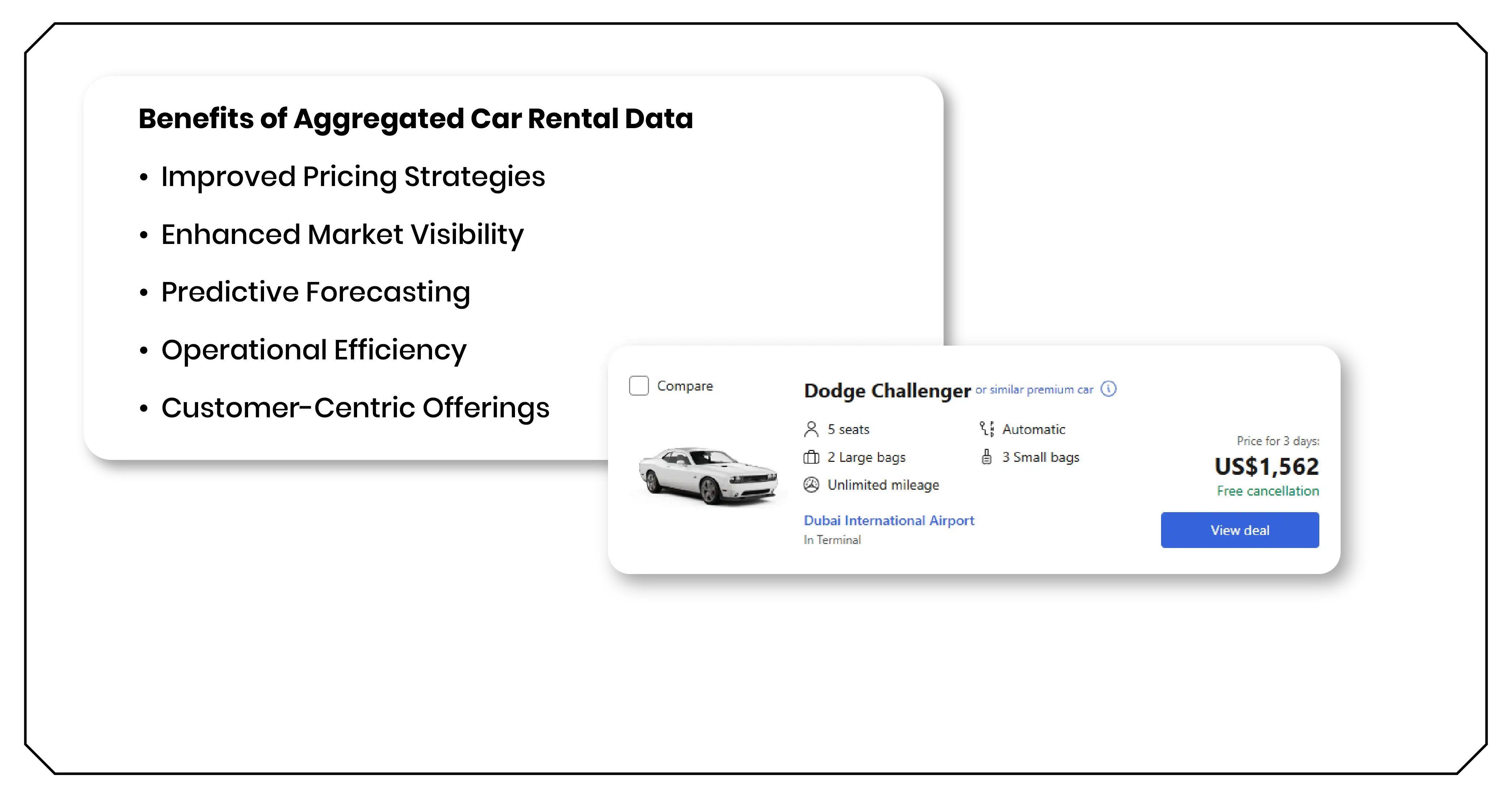How Can Businesses Benefit from Car Rental Data Aggregation for Market Analysis?

Introduction
The car rental industry is undergoing a major transformation as consumers increasingly seek flexible and cost-effective mobility solutions. For businesses, understanding market dynamics is crucial to optimize pricing strategies, identify emerging trends, and stay ahead of competitors. One of the most effective ways to achieve this is through Car Rental Data Aggregation for Market Analysis. By collecting, analyzing, and interpreting rental data from multiple sources, companies can gain actionable insights into pricing, demand patterns, and consumer behavior.
Modern travel and mobility platforms rely heavily on Car Rental Data Scraping Services to automate the extraction of data from multiple car rental providers. This approach allows businesses to access real-time and historical data from both peer-to-peer (P2P) platforms, such as Turo and Getaround, and traditional providers like Hertz, Avis, and Enterprise. By combining these data streams, companies can develop a holistic view of the market, ensuring that pricing strategies and fleet management decisions are backed by reliable intelligence.
One of the key challenges in the car rental market is capturing data from diverse sources. Scrape Car Rental Data from P2P platforms to present unique opportunities because these platforms often offer competitive pricing, unique vehicle options, and dynamic availability patterns that differ from traditional rental providers. P2P platforms are highly influenced by local market trends, seasonal demand, and individual owner pricing strategies, which makes analyzing their data critical for understanding emerging market behaviors.
Importance of Car Rental Data Aggregation

Aggregating car rental data from multiple sources enables businesses to uncover trends that would otherwise remain hidden. For instance, the Car Rental Price Trends Dataset allows analysts to monitor fluctuations in pricing across different vehicle types, locations, and booking windows. Such insights are invaluable for dynamic pricing strategies, fleet optimization, and targeted marketing campaigns. Understanding price trends also enables rental companies to forecast demand spikes during holidays, weekends, or local events, ensuring optimal utilization of their vehicles.
Traditional car rental providers remain a key part of the market. By using methods to Extract Car Rental Data from Traditional Providers, companies can monitor established industry players, track corporate pricing agreements, and analyze historical booking patterns. Traditional providers often maintain extensive historical datasets that can be leveraged to create predictive models for pricing, customer preferences, and fleet distribution. Combining this data with insights from P2P platforms ensures a comprehensive market analysis.
Leveraging Car Rental Data Intelligence
The integration of Car Rental Data Intelligence into business strategies allows companies to identify growth opportunities, reduce operational inefficiencies, and enhance customer experiences. Data intelligence tools can process large volumes of information to highlight correlations between rental demand, pricing fluctuations, vehicle type preferences, and geographic hotspots. For example, a spike in demand for SUVs in urban centers during holiday weekends can inform fleet repositioning strategies, promotional campaigns, and even partnership decisions with other mobility providers.
Effective Car rental price monitoring for market research involves continuous tracking of both P2P and traditional rental providers. This helps businesses identify pricing anomalies, detect seasonal patterns, and benchmark their rates against competitors. Additionally, monitoring competitor pricing in real time can help companies respond swiftly to market changes, offer competitive discounts, and improve revenue management strategies.
Location plays a critical role in the car rental business. Maintaining an updated Car Rental Location Dataset enables companies to analyze rental availability across cities, airports, and tourist hotspots. This geographic intelligence can drive business decisions such as where to expand fleets, which locations require promotional campaigns, or where pricing adjustments may be necessary based on local demand patterns.
Another key practice in market analysis is the ability to Scrape car rental listings and pricing data efficiently. Automation tools and web scraping technologies enable businesses to collect detailed information such as vehicle types, rental duration, booking windows, pricing tiers, and availability. This data forms the foundation for advanced analytics, predictive modeling, and business intelligence dashboards, empowering companies to make informed, data-driven decisions.
Predictive Modeling and Market Forecasting
With comprehensive datasets from P2P and traditional providers, companies can build predictive models to forecast rental demand and pricing trends. Machine learning algorithms and statistical models can identify patterns and correlations, helping businesses anticipate market fluctuations and optimize their offerings. For instance, predictive analytics can forecast peak booking periods for luxury vehicles, economy cars, or specialty rentals, allowing rental companies to adjust pricing dynamically. This approach minimizes revenue loss and ensures a competitive edge in the market.
The combination of P2P and traditional provider data also enables segmentation and personalized marketing. By understanding customer behavior across different platforms, companies can target specific demographics with customized offers, loyalty programs, and promotional campaigns. Advanced analytics can reveal which customer segments prefer self-driven rentals versus professional chauffeur services, helping businesses tailor their offerings accordingly.
Challenges in Aggregating Car Rental Data

Despite the clear benefits, aggregating car rental data presents several challenges. P2P platforms often have dynamic pricing and limited APIs, making real-time data collection complex. Traditional providers may use proprietary systems, restricting access to detailed datasets. Additionally, the diversity of vehicle types, rental durations, and geographic variations introduces complexity in data normalization and analysis.
To overcome these challenges, businesses rely on robust Car Rental Data Scraping Services that combine web scraping, API integration, and data cleaning methodologies. These solutions ensure that data is accurate, comprehensive, and ready for advanced analysis. By applying intelligent algorithms, companies can resolve discrepancies, harmonize datasets, and maintain a consistent framework for market analysis.
Benefits of Aggregated Car Rental Data

The benefits of a consolidated approach to car rental data are significant:
- Improved Pricing Strategies – By analyzing combined data from P2P and traditional providers, businesses can optimize rental rates and maximize revenue.
- Enhanced Market Visibility – Aggregated datasets reveal insights about competitor pricing, vehicle availability, and emerging trends.
- Predictive Forecasting – Historical and real-time data allows for accurate demand forecasting and strategic fleet allocation.
- Operational Efficiency – Data-driven decisions reduce idle inventory and improve resource utilization.
- Customer-Centric Offerings – Insights from aggregated data help design personalized promotions, loyalty programs, and location-specific deals.
How Travel Scrape Can Help You?
- Comprehensive Market Insights – Access real-time and historical data from both P2P and traditional rental providers to understand pricing trends, demand patterns, and competitive strategies.
- Optimized Pricing & Revenue – Monitor competitor rates, forecast demand, and implement dynamic pricing strategies to maximize profitability and reduce idle inventory.
- Location & Fleet Intelligence – Analyze rental availability across cities, airports, and tourist hotspots to make informed decisions on fleet allocation and expansion.
- Predictive Analytics – Use historical data to forecast high-demand periods, anticipate booking trends, and adjust offerings proactively.
- Operational Efficiency & Automation – Automate data collection for accurate, consistent, and scalable insights, saving time and resources while improving strategic decision-making.
Conclusion
In today’s competitive mobility landscape, the ability to integrate and analyze data from both P2P and traditional car rental providers is a game-changer. Real-time and historical car rental data collection ensures that businesses stay ahead of market trends, optimize pricing strategies, and improve fleet management. By employing advanced techniques for Web scraping car rental listings and consolidating insights from various sources, companies can maintain a competitive edge. The Global Car Rental Pricing Extract 2025 and associated datasets provide a roadmap for strategic growth, operational efficiency, and enhanced customer satisfaction in the car rental industry.
Ready to elevate your travel business with cutting-edge data insights? Scrape Aggregated Flight Fares to identify competitive rates and optimize your revenue strategies efficiently. Discover emerging opportunities with tools to Extract Travel Website Data, leveraging comprehensive data to forecast market shifts and enhance your service offerings. Real-Time Travel App Data Scraping Services helps stay ahead of competitors, gaining instant insights into bookings, promotions, and customer behavior across multiple platforms. Get in touch with Travel Scrape today to explore how our end-to-end data solutions can uncover new revenue streams, enhance your offerings, and strengthen your competitive edge in the travel market.